These days I have been thinking a lot about what it is that kept me doing what I do (photographically speaking) these last six years. I concluded that, for me, film photography is just the medium, but not the goal. Although I like pictures on film very much, I realized that it is not just about film. In fact, I am not really interested in using any last generation film SLR camera from the late 90s, which would arguably be the easiest and most practical access to film photography nowadays. What I really do enjoy is to take pictures with old cameras. That is my passion. The fact that such cameras do need film is just a happy coincidence. One that makes my commitment to film grow strong.
How old is "old"? Well, I cannot give a definite answer to that question: it depends on the camera. Generally speaking, a full-mechanical camera (no electronics, no batteries) made sometime between the early 20s and the late 70s of the past century can be interesting to me. But I do have (and use) a couple of cameras that are both older (1912) and younger (1989) than that. And not every camera from that period (there are thousands!) makes my heart skip a beat.
There have been few new cameras in this sixth year. For a couple of months I have been busy elsewhere and, in a sense, my old camera passion did recede a little bit on the first half of the year. Mostly because I have been distracted by bicycles. Especially older ones, as it could not be otherwise!
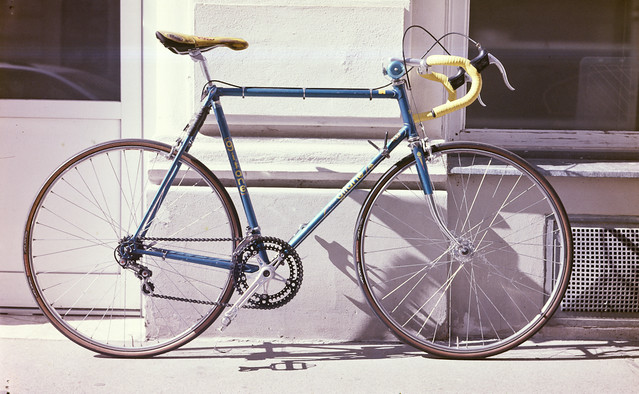
(Bergheil 9x12, Kodak Ektachrome 200 EPD, expired, ISO 200/24°)
There have been, quite unconsciously and mostly due to good luck, a couple of "redundant improvements" to my photographic stable. With this I mean cameras or lenses that I already had, this time in a new (and, to me, more desirable) fashion. I have long had a 1962 Exakta Varex IIa, the model with the name EXAKTA in block letters over a black background. This year I found another Exakta Varex IIa body, a little older (1957), with the more elegant engraved lettering on the front. Or a 1953 Zeiss Ikon Contessa 533/24, which I already have since 2012, now in a much less battered state and the rare matching leather case. The fact that I have this Contessa as a backup makes me less fearful of tackling with the repairs that my first Contessa needs (frozen slow speed escapement, rangefinder adjustment). Another very lucky strike made me the proud owner of a 1938 Voigtländer Bessa RF, in quite good condition and an intact yellow filter. It sports the most desirable Heliar f/3.5 lens. I already have a Bessa RF with a Skopar lens, which is nice and sharp, but is no Heliar. A couple of Zeiss Ikon Contaflex I, because the lens on them, the coated 45mm f/2.8 Tessar from West German Zeiss, is one of my favorites (it is the one that the Contessa has as well), and I could not resist a camera that allows looking directly through that lens. And finally, a rangefinder 1954 Kodak Retina IIc because it is a kind of bigger sister to our Retinette IA, the one with which everything began.
In this year, too, I managed to get some practical accessories for many of my cameras: leather cases, a 9x12 roll film back much more convenient than the one that I already had, a prism viewfinder for my Exakta Varex IIa and a Leitz VIOOH/Imarect universal external viewfinder for my Leica IIIa, just for the sake of it, because I still have only one lens on Leica screw mount. Ouch, that nasty collector in me... ;)
This year I shot less films than the previous one. There have been 11 rolls in black&white, from which the most shot was Kodak Tri-X 400, then 15 color negative rolls, Kodak Portra 400VC being the one I took most often, and 13 color slide films, from which, surprisingly, the one I shot the most was Kodak Ektachrome 64T in 9x12 sheet film format. A Kodak year, so to speak.
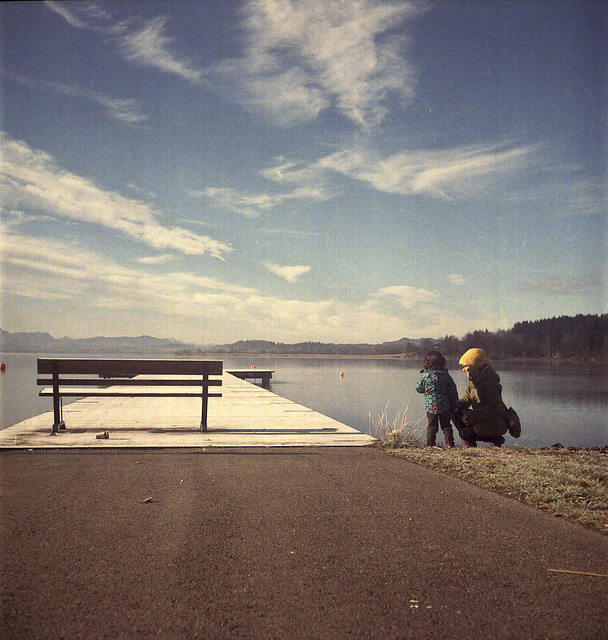
(Rolleiflex 631, Kodak Portra 400VC, expired, ISO 400/27°)
The camera I took most often was my Rolleiflex Automat 631 (8 films), followed one more year by the Contax II (6 films) and, quite worth mentioning, the Bergheil 9x12 plate camera with sheet film (4 sheets).
I am happy that this year I found the strength to keep servicing and repairing my cameras. Even though I took it again after a long pause just a couple of months ago (as I said, I have been busy/distracted servicing and repairing old bicycles), I found again excitement and peace in delving into the depths of a number of cameras and shutters.
My Rolleiflex Old Standard 621 was in need of some attention after having been a little neglected the last years. I carefully cleaned both lenses, which had gotten a little foggy, and dismantled the whole waist-level finder to clean the viewing system as well. I hoped to find the exact fabrication date of my camera hand-scratched behind the mirror, but unfortunately I found nothing. I managed to secure the flaps of the waist-level finder hood, which had always been a little shaky and never closed perfectly. Now the hood closes with a reassuring snap every single time. I managed to fix another of my Rolleiflexes, the Automat 631, as I already explained a couple of weeks ago. I am happy to report that the film transport mechanism operated flawlessly through the first film that I shot after the repair.
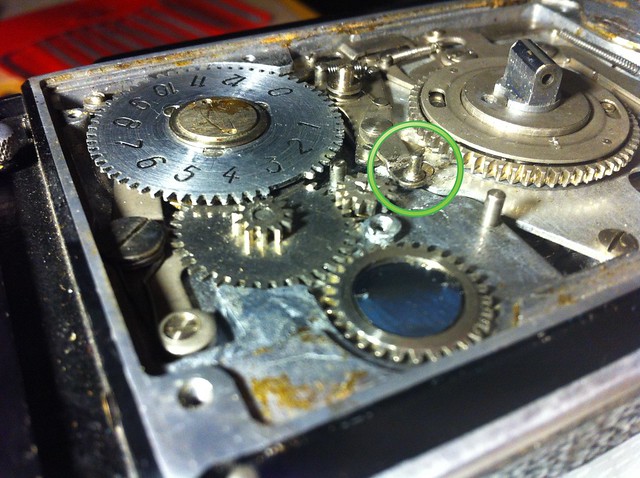
My still dormant Zeiss Ikon Contax S got a new set of shutter curtains but, alas, that did not solve the erratic locking of the wind mechanism that happens from time to time. Still a work in progress. As well as the aforementioned Zeiss Ikon Contaflex I, whose diaphragm stops down a little too slowly resulting in overexposed pictures. It needs a bit of lubrication in the aperture ring, or maybe a little more tension, or probably both.
As you see, I have still lots to do in the servicing & repair chapter. I hope I will find the time, inspiration and strength to keep going on.
One of my photographic realizations last year was how nice it felt to be able to create memories, what a warm feeling it is to look at pictures of my family, of my friends. The strongest motivation that I have to grab a camera is, still, to take a picture of my loved ones.
This year started with our family growing, we welcomed our second son in January.
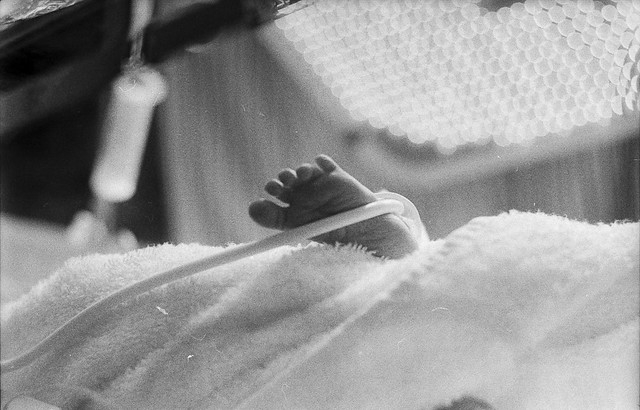
(Contax F, Kodak Tri-X 400, EI 1600/33°)
After a very challenging first month, in which photography was one of the few things that helped me keep my sanity, that brought me peace and solace, the inspiration slowly returned, and I managed to find happiness and enjoyment in creating such memories again.
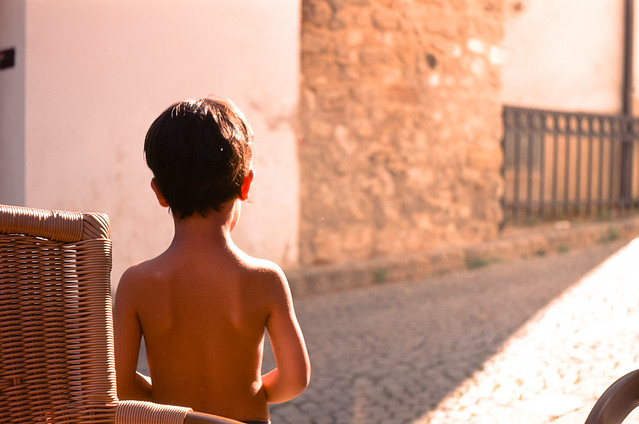
(Exakta Varex IIa, Fujichrome Velvia 50, expired, ISO 50/18°)
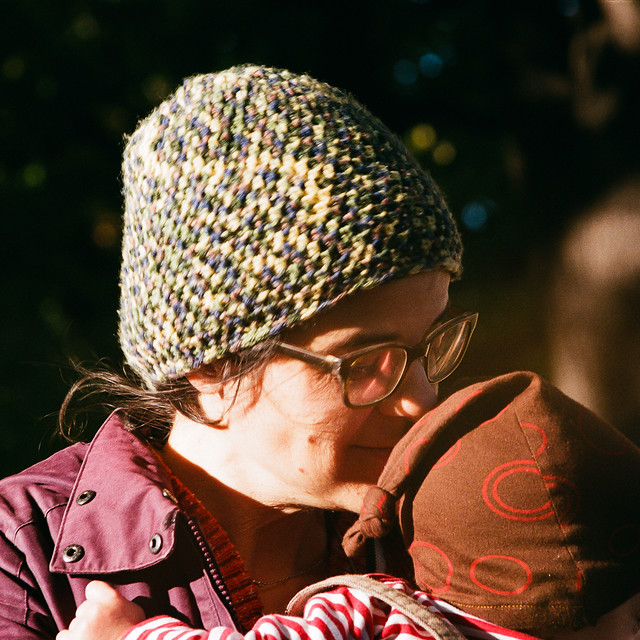
(Contax II, Porst Color-X 200, expired, ISO 200/24°)
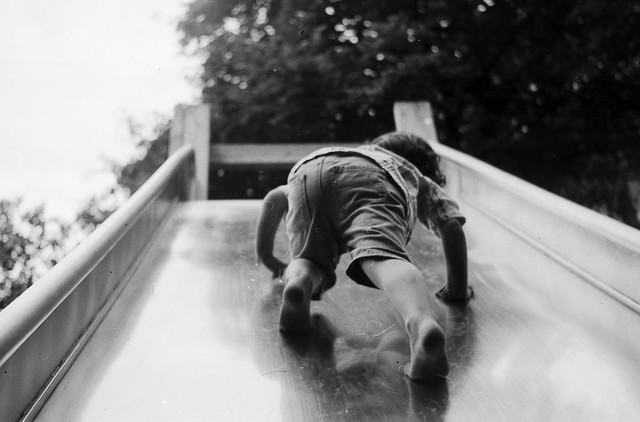
(Contessa 533/24, Ilford Delta 100, expired, ISO 100/21°)
And this, for me, is a very important endeavor. I have become very aware of the invisible but yet very real border that a child's memory cannot cross. My older son is able to recall easily, and with a surprising richness of detail, events that happened a year and a half ago. Yet, he cannot remember anything that happened before he turned 2 (he is 4 years old now). Neither single events, nor "bigger" things like how our flat looked back then. In the light of this, I have come to understand my pictures of them as a kind of poor, but still necessary, additional memories for my children, from a time in their lives that they are probably going to forever forget. I am happy to do this for them. I consider myself very fortunate.
As I did with my older son, ever since I knew my second son was going to be born in 2016, I started my search for a camera, an old one, made in 1916, a camera exactly 100 years older than him. Romantic as I still am, I want it to be able to take pictures. I thought that 1916 was not going to be as difficult as 1912, but to this day I have only one single candidate that could have been built 100 years ago: an Ansco Vest Pocket No. 1, which I got in my previous 1912 quest. The camera, though, is still not usable, because the bellows is badly worn and not light-tight. I was able to recover operation in the 100 year old Actus shutter, but unfortunately, I managed to destroy the diaphragm in the process (an aperture blade broke). I still could operate the camera always at full aperture, but there is still the leaky bellows problem.
I guess, thus, that the quest for a camera made in 1916 is still open. Hope dies last, and I am already longing to get a 1916 Voigtländer Alpin. In any case, I will be honored if you keep sharing this exciting journey with me.
No comments:
Post a Comment